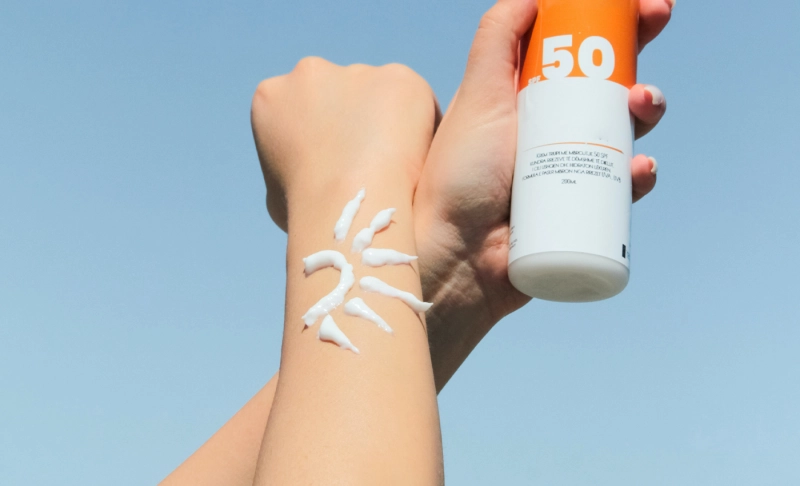By: Ishita Goel
November 26 2021
False: Sunscreen causes cancer, not sunlight.

The Verdict False
Reports have proven sunscreens protect against sun rays that can cause cancer. Further, claims that sunscreens are hazardous to health are false.
Reports have proven sunscreens protect against sun rays that can cause cancer. Further, claims that sunscreens are hazardous to health are false.Sunscreens are deemed safe and widely recommended to use as a protective measure against sun rays. The United States Food and Drug Administration(FDA) stated that in the United States, sunscreen is regulated as a "drug because it makes a drug claim - to help prevent sunburn or to decrease the risks of skin cancer and early skin aging caused by the sun." The American Academy of Dermatology Association(AAD) states, "Scientific evidence supports the benefits of using sunscreen to minimize short-term and long-term damage to the skin from the sun's rays." A Facebook post claiming sunscreen causes cancer was being shared widely. However, there are two types of sunscreens, chemical and physical, and both are safe to use. Chemical sunscreens contain one or more active ingredients that work like a sponge that absorbs sun rays, according AAD. Physical sunscreens work like a shield, sitting on the surface of your skin and deflecting the sun's rays. AAD advises using physical sunscreen if you have sensitive skin. While the ingredients in the chemical sunscreens seep into your skin and enter your bloodstream, the physical sunscreen's ingredients don't penetrate beyond the outer layer of your skin. Neither is harmful to the skin. Additionally, the American Academy of Dermatology and the Canadian Dermatology Association recommend that people use sunscreens to protect themselves from exposure to UV rays, which cause 80-90 percent of skin cancers. There is no scientific evidence to support that sunscreens can cause cancer. Healthline reports that estimates find that "80 percent of facial aging comes from being exposed to the sun's UV rays." Further, the sun can cause "dark spots, wrinkles, loss of firmness, sagging, and roughness over time." Research published in the National Center for Biotechnology Information(NCBI) in December 2014 on the efficacy and safety of sunscreen concluded: "high-quality evidence has shown that sunscreen reduces the risk of developing both melanoma and nonmelanoma skin cancer." American Cancer Society explains how UVA, UVB, and UVC rays affect and damage the skin. UVA can cause skin cells to age and can cause some indirect damage to cells' DNA. UVB can damage the DNA in skin cells directly and are the main rays that cause sunburns, and can cause skin cancer. Another research published in July 2021 in NCBI on "Sunscreens And Photoprotection" reviewed the benefits of using sunscreens and found chemical sunscreens consist of UVA and UVB blockers. Physical sunscreens consist of zinc oxide and titanium dioxide that protects against a wide range of UVAs. Broad-spectrum sunscreens absorb UV radiation from both the UVA and UVB portion. The research further informed that many "sunscreens include antioxidants such as vitamin C, vitamin E, silymarin, and green tea polyphenols." These protect from sunburn and erythema, decrease immunosuppression, erythema, photoaging, and photocarcinogenesis, and are anti-inflammatory and anti-carcinogenic. The authorities and organizations recommend always taking additional steps to protect your skin from the sun at peak times, including "seeking shade, and wearing protective clothing, hats, and sunglasses." In addition to checking the label of the sunscreens and use it accordingly, both the FDA and the CDC recommend a broad-spectrum sunscreen, which means it protects you from UVA and UVB sun rays; has an SPF of 30 or higher, and are water-resistant. It is proven that sun rays have UV radiation that can cause skin cancer. On the other hand, sunscreens can block these rays, protect and reduce cancer risk. Therefore it is false that sunscreen causes cancer.


